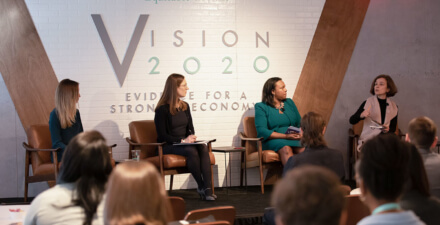Preview: Equitable Growth network at ASSA 2020 annual meeting

The 2020 annual meeting of the American Economics Association’s Allied Social Science Associations will be held January 3–5 in San Diego. The three-day meeting brings together more than 13,000 of the best minds in economics to network and celebrate new achievements in economic research.
The Washington Center for Equitable Growth will be active and well-represented at the conference through its academic network, grantees, and in-house policy experts. The following sessions have been organized by Equitable Growth and demonstrate the organization’s breadth of coverage of economic topics across disciplines related to whether and how inequality affects economic growth.
Economic Opportunity and the Impact of Race and Place
Friday, January 3, 8:00 a.m. – 10:00 a.m. (PST)
Economic opportunity and mobility vary dramatically in the United States, differing among racial groups and geographic locations. What does the growing body of research show about the causes of these disparities, particularly the impact of historical changes and policies? What are the place-based inequalities and structural barriers based on race that play a role in shaping opportunities for the next generation? What does it suggest about policy interventions to reinvigorate the promise of the American Dream? This panel will feature a conversation between leading scholars in this space in order to elevate the work that has been done and identify promising new frontiers for research.
Chair:
Heather Boushey, Washington Center for Equitable Growth
Panelists:
Randall Akee, University of California, Los Angeles
Ellora Derenoncourt, Princeton University
Patrick Kline, University of California, Berkeley
Rising Mark-ups and Monopoly Power
Sunday, January 5, 10:15 a.m. – 12:15 p.m. (PST)
Recent research suggests that mark-ups at the firm level have been rising since the 1980s. What has driven this increase, and what are the macroeconomic implications of rising mark-ups? Are rising mark-ups a sign of increasing monopoly power, or do they reflect other trends in the aggregate economy?
Chair:
Michael Kades, Washington Center for Equitable Growth
Panelists:
Nancy L. Rose, Massachusetts Institute of Technology
John Michael Van Reenen, Massachusetts Institute of Technology
Jan De Loecker, KU Leuven
Fiona Scott Morton, Yale University
The Economics and Policy of Automatic Stabilizers (Co-organized with the Hamilton Project)
Sunday, January 5, 8:00 a.m. – 10:00 a.m. (PST)
The focus will be on the economic policy challenges related to fiscal stabilization policy and automatic stabilizers specifically.
Chair:
Jay Shambaugh, Brookings Institution and George Washington University
Presenters:
Diane Whitmore Schanzenbach, Northwestern University
Claudia Sahm, Washington Center for Equitable Growth
Gabriel Chodorow-Reich, Harvard University
Discussants:
Jay Shambaugh, Brookings Institution and George Washington University
Heather Boushey, Washington Center for Equitable Growth
Noah Smith, Bloomberg
Also of note, on Friday, January 3 at 12:30 p.m. (PST), Heather Boushey will present ideas from Unbound: How Inequality Constricts Our Economy and What We Can Do About It for the David Gordon Memorial Lecture. And Claudia Sahm will be part of the panel for Using Social Media and Blogging to Engage Economists on Sunday, January 5 at 10:15 a.m. (PST).
Finally, Equitable Growth is hosting a reception on Friday, January 3 at 8:00 p.m. The reception is a chance to connect with other scholars, Equitable Growth staff, and our academic advisors to learn more about our research, grantmaking, academic programming, and policy engagement. Equitable Growth is pleased to welcome Dani Rodrik, Ford Foundation Professor of International Political Economy at Harvard University’s John F. Kennedy School of Government, who will give brief remarks about the efforts of Economics for Inclusive Prosperity, or EfIP. Friends and colleagues welcome; to RSVP and learn more about the reception, click here.






